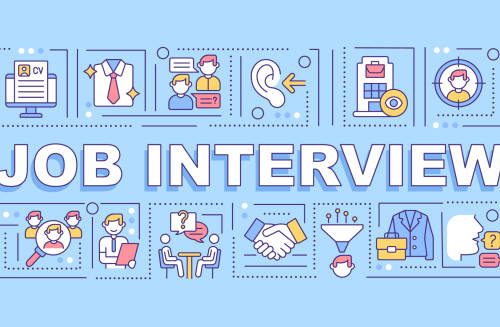Job Interviews – The Plight of the Workplace

Just relax, they’re people too you know
Job interviews are the last step in the recruitment process that I’m convinced is only a formality to make sure the application or CV matches the candidate. Having said this however, it’s clear that your job interview needs to be good regardless. I mean not only does it show the employer what you can do, but it also allows you to asses if the role is right for you (Finn 2018). There inline lies the problem with job interviews, as being effective in a job interview is a skill of its own. This is especially a problem as we move more and more towards digital forms of communication. Some people are gifted with confident face to face conversation with strangers. However, I’d gamble most people are not. In fact 93% of people feel anxious before a job interview(Babu 2020). With all this said, I feel that the simulated interviews offered as part of AEL:3001 were a good way to keep us on our toes with job interviews, especially seeing as how our peers were able to construct their own list of questions to ask us. In this blog I will be reflecting on my own personal experience in this process using Gibb’s reflective model with the help of some pre-interview context to help put the whole thing into perspective.

The Prologue
The job I applied for was a salaried AV technician for a production company in Edinburgh. Considering I already do this role in a free lance capacity, I felt that I would have a unique perspective in this field that would allow me to answer questions effectively. Although seeing as this sort of work is usually secured with networking in the industry, I really didn’t know what to expect from this interview.
Wait, That Really Wasn’t So Bad After all
So this was it. Going second to last in my group only served to heighten the anticipation of this exercise. I patiently waited in hallway the to be called in by my peers as they carefully prepared a set of questions tailored to my role .
I’d be remis to say I wasn’t very nervous going into this process. I’ve been at my current job so long I don’t even remember what it’s like to apply for jobs and what if things are different these days? Was I going to produce incoherent word salad as a response or was I going to hit a brick wall of higher brain function and just stumble at every turn? To my surprise I handled it well for the most part.
In the beginning period I spoke quite quickly and at times unclearly to the point where I was having to repeat myself. As the interview went on I did begin to take more control of my responses as I used my experience as a freelance lighting technician to answer the more focused questions. With my peers presenting me with these questions I was able to use my experience in the role to provide detailed and nuanced responses. For instance they asked me how I would handle clients on a day-to-day basis and right away I made the connection between clients hiring an AV firm and touring acts that would play shows in the venue I freelance at. I explained that as lightening technician, one of my key roles is to liaise with tour managers and touring lighting techs to (1 Walk LTs through the venue rig and make the necessary accommodations in helping them set up touring fixtures and (2 In the absence of a touring lighting tech, discuss with the TM how the show should look for the act and demonstrate the ability to recrate that show. In this response I showed my aptitude for working with new people on a regular basis and overcoming the various challenges associated with that. Thebalence.com touched on this in their fantastic article on how to answer questions about your experience (Doyle 2022).

This experience was particularly useful as it enabled me to learn how to put my experience in this industry into words that would form a strong response in an interview situation. This process also gave me areas to improve upon as highlighted in my peer’s feedback sheet.
In the future I now know the areas I can work on in order to compete the perfect interview. This process has given me the tools to realise that goal. Upon reading my feedback sheet I discovered my main areas of improvement were eye contact and pacing. “Focus more on delivery rather than giving off-the-cuff replies” (Moran 2011) perfectly incapsulates what I mean here. I did spend most of the interview focusing on giving the best possible answers and nothing else. With a little more thought put into how I present myself I am confident I can improve upon this in the future.
This process was frankly a must have for anyone in the world of work (so anyone) because even though my chosen career path is forged more by apprenticeships and networking, the reality is that circumstances change (like when a pandemic happens for no good reason) and nobody knows where they’ll be in five or ten years and it may just be the case that in some stage of the future I’ll once again find myself across the interview table putting on a brave face and trying not to come across as a complete idiot.

Bibliography
Gibbs, G. (1988). Learning by Doing: A Guide to Teaching and Learning Methods. Oxford: Oxford Further
Education Unit
Babu, S. (2020) 93% of people you interview for a job feel anxious, Small Business Trends. Available at: https://smallbiztrends.com/2020/05/job-interview-anxiety-survey.html (Accessed: February 20, 2023).
Moran, M. (2011) Five ways to improve your interview technique, The Guardian. Guardian News and Media. Available at: https://www.theguardian.com/careers/careers-blog/five-ways-to-improve-your-interview-technique (Accessed: February 20, 2023).
Doyle, A. (2022) Best answers for job interview questions about experience, The Balance. The Balance. Available at: https://www.thebalancemoney.com/job-interview-question-what-experience-do-you-have-2061260 (Accessed: February 20, 2023).
Finn, L. (2018) Purpose of job interviews, CHRON. CHRON. Available at: https://work.chron.com/purpose-job-interviews-11989.html (Accessed: February 20, 2023).
You May Also Like

To Be Or Not To Be – That Is The Interview Question
23 February 2023
Job Interviews: Selling Yourself For A Pay Cheque
24 February 2023

